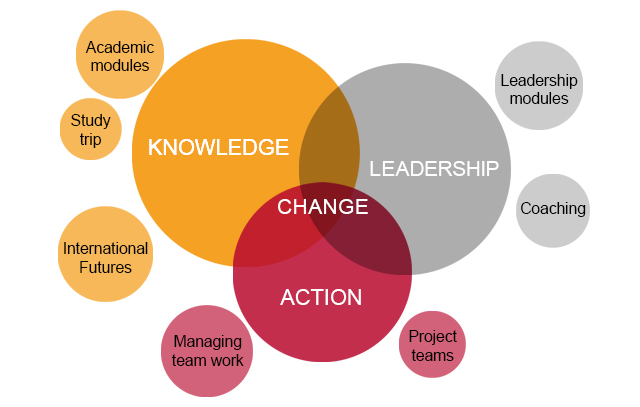Setup and contents of the MGG Academy

The MGG Academy consists of a knowledge component, a leadership component, and an action component:
KNOWLEDGE: Academic modules, study trip and International Futures
The academic modules provide an academic and practice-oriented space for the creation of knowledge and serve as a platform for dialogue. They aim at deepening analytical proficiencies and the capacities for domestic and international policymaking in a global perspective. Topics range from instruments and actors of global governance to global challenges and potential solutions. Speakers include renowned scholars, practitioners and government representatives.
A study trip to Brussels adds first-hand practical insights into policy making.
International Futures is a seminar organised in cooperation with the German Federal Foreign Office. It takes place in Berlin. The focus lies on the exploration of opportunities and challenges for diplomacy in the age of globalisation and digitalisation.
LEADERSHIP: Leadership modules, coaching and management skills
The leadership modules aim at strengthening individual and collective leadership competencies and support deep reflection on personal values and attitudes.
Coaching offers a space to support each participant in his/her individual learning process. Participants can reflect upon relevant questions, challenges and topics, e.g. their role in the group, the transfer of knowledge, future competency development and career plans, etc.
Management skills, such as working in international teams and moderation, are frequently needed in daily work processes such as team meetings, conferences and training sessions. Tailor-made/customised workshops support the participants in improving these skills.
ACTION: Change maker projects
The change maker projects provide a free learning space. The participants collaborate in small teams and develop solutions for a concrete sustainability challenge. This component offers ample opportunities for in-depth discussions, expert interviews, excursions as well as for experiencing and reflecting on the challenges of international cooperation.
The change maker projects include three levels of learning:
- exploring a concrete topic and developing a hands-on solution
- applying the design thinking method for innovative problem solving and
- practicing and enhancing competencies to collaborate in highly diverse teams.
